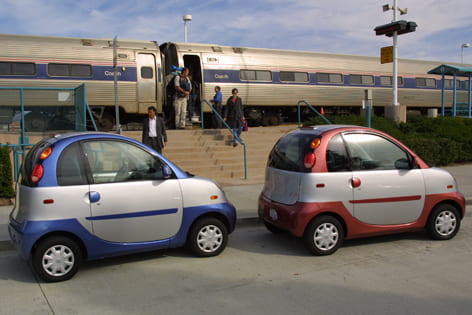Driving innovation
A number of initiatives under way at UC Irvine that aim to lessen dependency on individual cars and uncertain oil supplies directly benefit the environment and consumer budgets.

Drill, baby, drill?
Or go electric … downsize … carpool … think sustainability?
The debate ensues and the issues are not as simple as recent election rhetoric would imply.
A number of initiatives under way at UC Irvine that aim to lessen dependency on individual cars and uncertain oil supplies directly benefit the environment and consumer budgets. Programs initiated by UCI’s Parking & Transportation Services and National Fuel Cell Research Center earned the campus a 2008 Clean Air Award in October from the South Coast Air Quality Management District. Here’s a look at the award-winning efforts.
Responsible commuting
Parking & Transportation Services was honored for its Sustainable Transportation programs. Each year, UCI carpoolers help eliminate more than 39 million vehicle miles and 18,600 tons of greenhouse gas emissions while saving the university more than $21 million in deferred parking structure construction.
UCI’s 1.87 average vehicle ridership – a measure that determines the average number of people per vehicle – is one of the highest for an employer of comparable size in Southern California, and has earned the campus a designation as one of the best workplaces for commuters by the U.S. Environmental Protection Agency.
“Sustainable transportation is good for the environment and public health – and it also helps conserve money,” says Mike Davis, transportation coordinator for the sustainable transportation division. “Our greatest concern is the air quality in Southern California.”
The campus community also is encouraged to participate in sustainable transportation programs such as Zipcar, which offers vehicles by the hour or day for errands, meetings or fun. Each of the eight available Zipcars cost $7 per hour or $49 per day. A Toyota Sienna van is offered for $11 per hour or $77 per day. Rates include cost of the rental, gas, mileage (up to 180 miles a day) and insurance. Currently, Zipcar serves 740 clients.
Innovative commuting
ZEV-NET, or Zero Emission Vehicle Network Enabled Transport, also was lauded in the Clean Air Award. The unique transportation system, managed by UCI’s National Fuel Cell Research Center and the Institute of Transportation Studies in cooperation with Toyota, couples mass transit benefits with the flexibility of a personal car.
Participating commuters arrive at the Irvine Transportation Center by train and unlock a zero- or low-emission vehicle. Once at work, the vehicles – which include the Toyota RAV4 EV (a zero-emissions version of the popular sport utility vehicle) and the Prius – are available for local use.
At day’s end, commuters return the cars to the station, where they are recharged overnight.
The program’s goal is to use novel information technologies, fuel cells, electric vehicles, advanced research and the concept of shared use to help solve traffic congestion, air pollution and oil dependency.
“The ZEV-NET initiative brings together many and varied segments of our community in combination with emerging new technologies,” says Scott Samuelsen, NFCRC director. “This is a unique strategic alliance both within and outside the university that is dedicated to creative and environmentally responsible transportation alternatives for California.”
